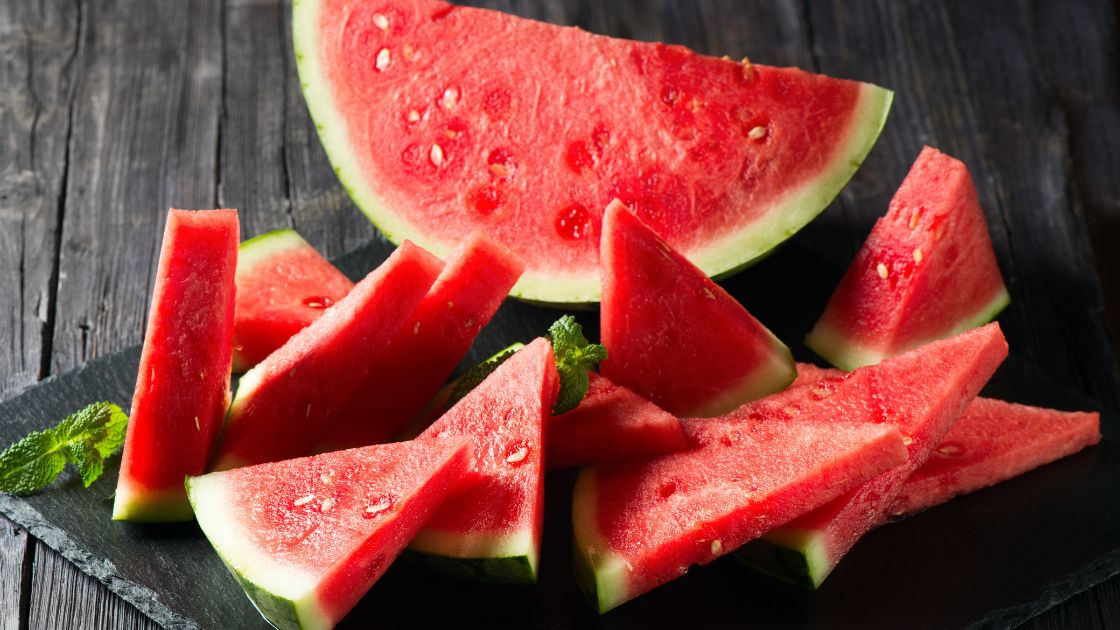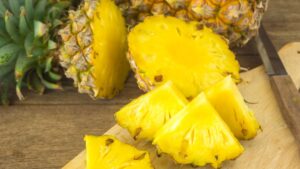- It is a refreshing fruit that is high in nutrients and can benefit our health
- It is mostly made up of water and fiber, making it beneficial for digestion
- It is hydrating and can help maintain hydration levels in our bodies
- It contains plant substances that may have antitumor effects and support heart health
- It offers additional health benefits, such as reducing muscle soreness, lowering blood pressure, and supporting skin health
Did you know that watermelon has a surprising capacity to refresh you and fill you with nutrients?
Well, if you didn’t know, now is the time.
It is a fruit you can eat directly, and you will feel refreshed and satiated immediately. Its powerful nutrients bring surprising benefits to our health.
Read on to learn a little more about this juicy fruit and everything it has to offer.
Physical description
The watermelon plant has long stems and lobed leaves and can creep and climb.
Its fruit is a berry with strong green skin and tasty, more or less reddish pulp.
This plant is a member of the genus Cucurbitaceous.
Citrullus lanatus is its official scientific name.
It has some herbaceous stems, some of which can be up to 5 meters long.
They have longitudinal grooves and are cylindrical.
The underside of the leaves is quite rough and has visible veins, while the upperside is relatively smooth.
The leaf segments are rounded and have three to five lobes each.
Flowers are produced in the axils of the leaves.
They are yellow and are both male and female.
Usually, insects spread pollen from them.
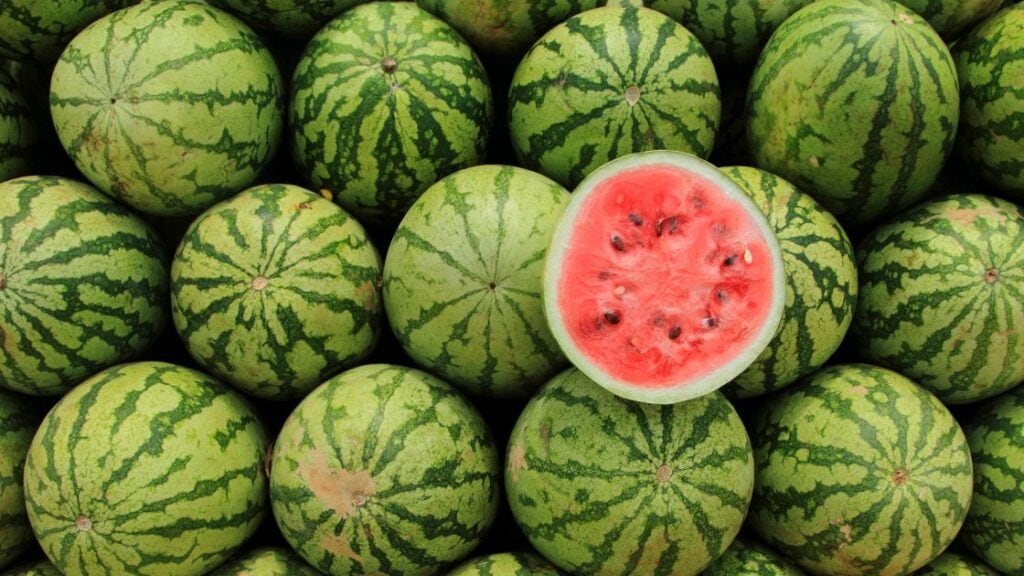
And what about the fruit?
Watermelons are large, roughly spherical berries that range in size from 2 to 15 kilograms and are produced by female flowers.
The pulp is pinkish or reddish and contains many crushed seeds of various colors (brown, black, or white).
The rind may be smooth or distinctly striped, dark green, or pale green.
Watermelon is usually eaten raw, either sliced, quartered, or even diced.
You can make sorbet, puree, and jam with it.
In Russia, watermelon juice is used to make a highly prized wine.
The bark is occasionally used to produce jam or sweet brine and, in rural areas, is fed to livestock.
It is high in water, low in fat or protein, and therefore low in calories.
It is also an essential source of potassium and vitamin A.
It is a fruit with diuretic qualities that is refreshing.
History and production
Since ancient times, watermelons have grown wild in the savannahs and deserts of southern Africa, particularly the Kalahari.
Watermelons are descended from these wild varieties.
Watermelons were introduced to North Africa during the Early Ages.
They have been depicted in artwork found in Egyptian tombs dating back over 5,000 years.
The first civilization that grew watermelons for a sweeter taste was Ancient Egypt.
Over time, the watermelons were shipped via trade routes to the Mediterranean.
Watermelon fruit was first brought to India in the 7th century, eventually reaching China somewhere in the 10th century.
This fruit was introduced to the New World by colonists and the slave trade.
It was grown in the South and Thomas Jefferson’s Monticello Garden.
Know now the nutritional value of watermelons.
Nutrition Facts about Watermelon
Potassium, magnesium, vitamins A and C, and other minerals can all be found in watermelon.
A cup (152 grams) of diced, raw watermelon contains the following nutrients:
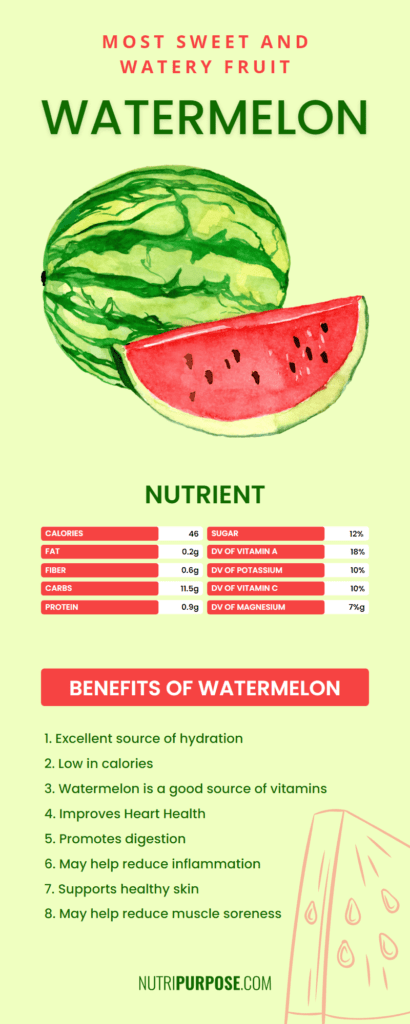
- 46 Calories
- 0.2 grams of Fat
- 0.6 grams of Fiber
- 11.5 grams of Carbs
- 0.9 grams of Protein
- 9.4 grams of Sugar
- 5% of the Daily Value (DV) of Vitamin A
- 4% of the DV of Potassium
- 14% of the DV of Vitamin C
- 4% of the DV of Magnesium
Citrulline, an amino acid that may boost exercise performance, is also abundant in watermelon.
As a bonus, it contains antioxidants like vitamin C, carotenoids, lycopene, and cucurbitacin E.
Antioxidants can reduce and eliminate free radicals in our bodies.
Free radicals are unstable molecules that can harm our cells if they build up in our bodies.
This harm could eventually result in diabetes, heart disease, and cancer.
Thanks to all these nutrients, watermelon can provide us with excellent benefits; learn a little about them.
Watermelon health benefits
May enhance digestion
Watermelon has a lot of water and only a little bit of fiber.
Both of them are essential for a healthy digestive system.
While water carries waste more effectively through your digestive tract, fiber helps keep bowel movements regular.
According to a survey of 4,561 adults, people who consume less fluid and fiber are more likely to experience constipation.
To consume additional fiber, it is also good to eat corn, broccoli, bananas, asparagus, and spinach.
These foods are a great source of fiber, too.
Maintains your hydration
Our bodies need water to function properly, so we must stay hydrated.
Just a few bodily functions that depend on sufficient hydration include:
- Regulation of body temperature.
- The supply of nutrition to cells.
- A normal function of organs.
- The attention.
Our bodies require water to function properly, and eating foods with a high water content can help.
Since watermelon is 92% water, it is an excellent choice for our daily water intake.
In addition, due to its high water content, this watermelon has a low caloric density per unit weight.
Consuming low-calorie foods such as watermelon can also help control weight since it prolongs the feeling of satiety.
Cantaloupe and honeydew melon are also very hydrating fruits.
If you need to consume diuretic foods, these are also good options.
Possibility of antitumor effects
Watermelon contains several plant substances, such as lycopene and cucurbitacin E, which may have anticancer properties.
Despite conflicting research findings, lycopene consumption may reduce the risk of certain malignancies.
This includes diseases such as prostate and colorectal cancer.
IGF, a hormone that stimulates cell division, is believed to be reduced in the blood by the presence of lycopene.
In particular, cancer develops when cell division goes out of control.
Also, cucurbitacin E may slow the development of tumors by encouraging cancer cells to undergo autophagy.
The body expels damaged cells through this process called autophagy.
More research on this in humans is still required, but the results obtained so far are very encouraging.
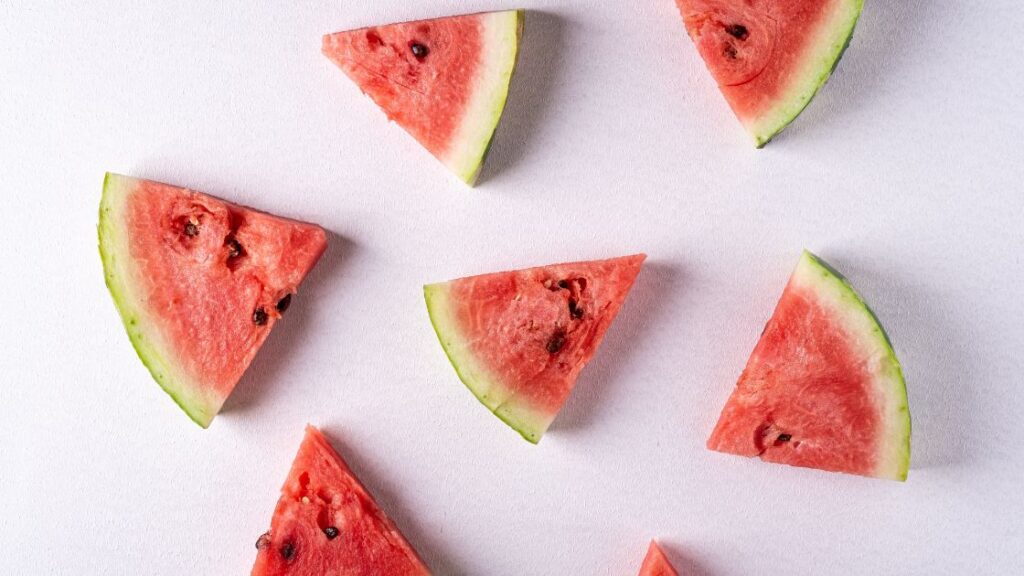
Could raise heart health
Several of the minerals in watermelon may support heart health.
The leading cause of death worldwide is cardiovascular disease.
Remembering that lifestyle and dietary choices can prevent these diseases is important.
A healthy lifestyle and diet reduce the risk of heart attack and stroke by lowering blood pressure and cholesterol levels.
According to studies, lycopene can help lower blood pressure and cholesterol.
In addition, it could decrease the risk of oxidative damage caused by high cholesterol.
Citrulline, an amino acid found in watermelon, can raise nitric oxide levels in the body.
Nitric oxide also facilitates the expansion of blood vessels, which lowers blood pressure.
Magnesium, potassium, vitamins A, B6, and C, as well as other heart-healthy nutrients, are also present in watermelon.
All of them contribute to the maintenance of good cardiovascular health.
Now you know the health benefits of watermelons, and you surely want to try them.
Look at these watermelon recipes and start enjoying their flavor.
Other Health Benefits
Watermelon is not only a delicious snack, but it also offers numerous other health benefits.
One of these benefits is its ability to reduce muscle soreness.
The amino acid L-citrulline found in watermelon helps to reduce muscle soreness and improve exercise performance.
So, next time you hit the gym, consider enjoying a slice of watermelon afterward to aid in muscle recovery.
In addition to its muscle-soothing properties, watermelon also has the potential to lower blood pressure.
This is due to its high content of L-citrulline, which gets converted into nitric oxide in the body.
Nitric oxide helps to relax and dilate blood vessels, improving blood flow and reducing hypertension.
Watermelon is also a great source of essential nutrients like vitamin B6 and electrolytes.
These nutrients help to maintain a healthy heart rate and blood sugar levels.
Additionally, watermelon’s high water content helps keep you hydrated, especially during hot summer days or intense workouts.
Another surprising benefit of watermelon is its potential to protect against prostate cancer.
This is due to its high lycopene intake, which has been linked to a reduced risk of prostate cancer in several studies.
So, including watermelon in your diet can be a tasty way to support your prostate health.
Watermelon is also great for your skin.
It contains collagen, which is essential for healthy skin and can help to repair skin cells.
The high water content of watermelon also helps to keep your skin hydrated and prevent dryness.
If you’re looking for a refreshing way to enjoy watermelon, try making a watermelon smoothie.
Simply blend watermelon chunks with some ice and a squeeze of lemon or lime juice for a delicious and hydrating treat.
You can also add other fruits like berries or pineapple for added flavor and nutrients.
Overall, watermelon is a nutrient-packed fruit that offers a range of health benefits.
So, next time you’re craving a sweet and refreshing snack, reach for some watermelon and enjoy its many advantages for your well-being.
Watermelon recipes to prepare yourself
Hummus with Spicy Watermelon
Preparation time: 15 minutes
Serving: 6
Ingredients:
- 1 large garlic clove
- 1/4 cup finely chopped parsley
- 2 tablespoons finely chopped onion
- 1 tablespoon extra virgin olive oil
- 1 cup watermelon juice (blend watermelon pulp in a blender, just the pulp, no water)
- 1/2 teaspoon lemon zest
- 1 teaspoon lemon juice
- 1/4 teaspoon coriander
- 1/4 teaspoon ground cumin
- 1/4 teaspoon paprika
- 1/4 teaspoon ground ginger
- 1/4 teaspoon turmeric
- 15 ounces chickpeas
- Sprigs of parsley to taste to decorate
- Watermelon cut into cubes to taste to decorate
- Salt and pepper to taste
Procedure:
- Mince the garlic. You can make it faster with the help of a food processor.
- Blend parsley and onion in the processor until finely chopped. Add and mix the remaining ingredients.
- Place the flavors in the refrigerator for at least 30 minutes to allow the flavors to blend.
- Chop watermelon chunks and parsley sprigs for garnish.
- Serve with baked chips, baby carrots, or pita bread.
Watermelon Breakfast ready to go
Preparation time: 10 minutes
Serving: 1
Ingredients:
- 1/2 cup granola
- 1 cup of watermelon chunks
- 6 ounces of yogurt of choice (you can use your favorite flavor)
Procedure:
- Layer ingredients in the following sequence in a tall glass or to-go container:
- Half the granola
- Half of the pieces of watermelon
- Half of the yogurt
- Repeat the same procedure twice to get two layers of each element.
Watermelon-based sports drink
Preparation time: 10 minutes
Serving: 1
Ingredients:
- 1 cup of cold water
- 3 cups of chopped watermelon
- 1 tablespoon of honey or maple syrup (optional)
- 1 lime in juice
Procedure:
- Blend all the ingredients in a blender until thoroughly joined.
Watermelon is one of my favorite fruits. I love eating it at any time of the day. Mark Twain also loves it:
“When one has tasted watermelon he knows what the angels eat.”
Enrico Caruso also loves watermelon:
Enjoy Watermelon
Watermelon is the sweetest and wateriest fruit your palate can find.
It’s perfect for that hot summer or pool day.
If you practice any sport frequently, you will love watermelon juice.
It will provide you with nutrients that will recharge you while you refresh yourself at the same time.

I am a professional health and nutrition writer with extensive experience in the industry. My passion for sharing valuable insights on nutrition and wellness stems from over 15 years of personal training and maintaining a healthy lifestyle. My commitment to continuously educate myself on the latest trends and research in the field allows me to deliver high-quality content that is informative and engaging. My mission is to empower individuals to make informed decisions about their health and well-being through my writing.
